- Home
- Frederick Douglass
Complete Works of Frederick Douglass Page 3
Complete Works of Frederick Douglass Read online
Page 3
“He had already gained my confidence; as how could it be otherwise? I knew enough of religion to know that the man who prays in secret is far more likely to be sincere than he who loves to pray standing in the street, or in the great congregation. When he arose from his knees, like another Zacheus, I came down from the tree. He seemed a little alarmed at first, but I told him my story, and the good man embraced me in his arms, and assured me of his sympathy.
“I was now about out of provisions, and thought I might safely ask him to help me replenish my store. He said he had no money; but if he had, he would freely give it me. I told him I had one dollar; it was all the money I had in the world. I gave it to him, and asked him to purchase some crackers and cheese, and to kindly bring me the balance; that I would remain in or near that place, and would come to him on his return, if he would whistle. He was gone only about an hour. Meanwhile, from some cause or other, I know not what, (but as you shall see very wisely,) I changed my place. On his return I started to meet him; but it seemed as if the shadow of approaching danger fell upon my spirit, and checked my progress. In a very few minutes, closely on the heels of the old man, I distinctly saw fourteen men, with something like guns in their hands.”
“Oh! the old wretch!” exclaimed Mrs. Listwell “he had betrayed you, had he?”
“I think not,” said Madison, “I cannot believe that the old man was to blame. He probably went into a store, asked for the articles for which I sent, and presented the bill I gave him; and it is so unusual for slaves in the country to have money, that fact, doubtless, excited suspicion, and gave rise to inquiry. I can easily believe that the truthfulness of the old man’s character compelled him to disclose the facts; and thus were these blood-thirsty men put on my track. Of course I did not present myself ; but hugged my hiding-place securely. If discovered and attacked, I resolved to sell my life as dearly as possible.
“After searching about the woods silently for a time, the whole company gathered around the old man; one charged him with lying, and called him an old villain; said he was a thief; charged him with stealing money; said if he did not instantly tell where he got it, they would take the shirt from his old back, and give him thirty-nine lashes.
“‘I did not steal the money,’ said the old man, ‘it was given me, as I told you at the store; and if the man who gave it me is not here, it is not my fault.’
“‘Hush! you lying old rascal; we’ll make you smart for it. You shall not leave this spot until you have told where you got that money.’
“They now took hold of him, and began to strip him; while others went to get sticks with which to beat him. I felt, at the moment, like rushing out in the midst of them; but considering that the old man would be whipped the more for having aided a fugitive slave, and that, perhaps, in the melée he might be killed outright, I disobeyed this impulse. They tied him to a tree, and began to whip him. My own flesh crept at every blow, and I seem to hear the old man’s piteous cries even now. They laid thirty-nine lashes on his bare back, and were going to repeat that number, when one of the company besought his comrades to desist. ‘You’ll kill the d — d old scoundrel! You’ve already whipt a dollar’s worth out of him, even if he stole it!’ ‘O yes,’ said another, ‘let him down. He’ll never tell us another lie, I’ll warrant ye!’ With this, one of the company untied the old man, and bid him go about his business.
“The old man left, but the company remained as much as an hour, scouring the woods. Round and round they went, turning up the underbrush, and peering about like so many bloodhounds. Two or three times they came within six feet of where I lay. I tell you I held my stick with a firmer grasp than I did in coming up to your house tonight. I expected to level one of them at least. Fortunately, however, I eluded their pursuit, and they left me alone in the woods.
“My last dollar was now gone, and you may well suppose I felt the loss of it; but the thought of being once again free to pursue my journey, prevented that depression which a sense of destitution causes; so swinging my little bundle on my back, I caught a glimpse of the Great Bear (which ever points the way to my beloved star,) and I started again on my journey. What I lost in money I made up at a hen-roost that same night, upon which I fortunately came.”
“But you did ‘nt eat your food raw? How did you cook it?” said Mrs. Listwell.
“O no, Madam,” said Madison, turning to his little bundle:— “I had the means of cooking.” Here he took out of his bundle an old-fashioned tinder-box, and taking up a piece of a file, which he brought with him, he struck it with a heavy flint, and brought out at least a dozen sparks at once. “I have had this old box,” said he, “more than five years. It is the only property saved from the fire in the dismal swamp. It has done me good service. It has given me the means of broiling many a chicken!”
It seemed quite a relief to Mrs. Listwell to know that Madison had, at least, lived upon cooked food. Women have a perfect horror of eating uncooked food. By this time thoughts of what was best to be done about getting Madison to Canada, began to trouble Mr. Listwell; for the laws of Ohio were very stringent against any one who should aid, or who were found aiding a slave to escape through that State. A citizen, for the simple act of taking a fugitive slave in his carriage, had just been stripped of all his property, and thrown penniless upon the world. Notwithstanding this, Mr. Listwell was determined to see Madison safely on his way to Canada. “Give yourself no uneasiness,” said he to Madison, “for if it cost my farm, I shall see you safely out of the States, and on your way to a land of liberty. Thank God that there such a land so near us! You will spend to-morrow with us, and to-morrow night I will take you in my carriage to the Lake. Once upon that, and you are safe.”
“Thank you! thank you,” said the fugitive; “I will commit myself to your care.”
For the first time during five years, Madison enjoyed the luxury of resting his limbs on a comfortable bed, and inside a human habitation. Looking at the white sheets, he said to Mr. Listwell, “What, sir! you don’t mean that I shall sleep in that bed?”
“‘Oh yes, oh yes.”
After Mr. Listwell left the room, Madison said he really hesitated whether or not he should lie on the floor; for that was far more comfortable and inviting than any bed to which he had been used.
We pass over the thoughts and feelings, the hopes and fears, the plans and purposes, that revolved in the mind of Madison during the day that he was secreted at the house of Mr. Listwell. The reader will be content to know that nothing occurred to endanger his liberty, or to excite alarm. Many were the little attentions bestowed upon him in his quiet retreat and hiding-place. In the evening, Mr. Listwell, after treating Madison to a new suit of winter clothes, and replenishing his exhausted purse with five dollars, all in silver, brought out his two-horse wagon, well provided with buffaloes, and silently started off with him to Cleveland. They arrived there without interruption, a few minutes before sunrise the next morning. Fortunately the steamer Admiral lay at the wharf, and was to start for Canada at nine o’clock. Here the last anticipated danger was surmounted. It was feared that just at this point the hunters of men might be on the look-out, and, possibly, pounce upon their victim. Mr. Listwell saw the captain of the boat; cautiously sounded him on the matter of carrying liberty-loving passengers, before he introduced his precious charge. This done, Madison was conducted on board. With usual generosity this true subject of the emancipating queen welcomed Madison, and assured him that he should be safely landed in Canada, free of charge. Madison now felt himself no more a piece of merchandise, but a passenger, and, like any other passenger, going about his business, carrying with him what belonged to him, and nothing which rightfully belonged to anybody else.
Wrapped in his new winter suit, snug and comfortable, a pocket full of silver, safe from his pursuers, embarked for a free country, Madison gave every sign of sincere gratitude, and bade his kind benefactor farewell, with such a grip of the hand as bespoke a heart full of honest manliness, and a sou
l that knew how to appreciate kindness. It need scarcely be said that Mr. Listwell was deeply moved by the gratitude and friendship he had excited in a nature so noble as that of the fugitive. He went to his home that day with a joy and gratification which knew no bounds. He had done something “to deliver the spoiled out of the hands of the spoiler,” he had given bread to the hungry, and clothes to the naked; he had befriended a man to whom the laws of his country forbade all friendship, — and in proportion to the odds against his righteous deed, was the delightful satisfaction that gladdened his heart. On reaching home, he exclaimed, “He is safe, — he is safe, — he is safe,” — and the cup of his joy was shared by his excellent lady. The following letter was received from Madison a few days after.
“WINDSOR, CANADA WEST, DEC. 16, 1840.
My dear Friend, — for such you truly are: —
Madison is out of the woods at last; I nestle in the mane of the British lion, protected by his mighty paw from the talons and the beak of the American eagle. I AM FREE, and breathe an atmosphere too pure for slaves, slave-hunters, or slave-holders. My heart is full. As many thanks to you, sir, and to your kind lady, as there are pebbles on the shores of Lake Erie; and may the blessing of God rest upon you both. You will never be forgotten by your profoundly grateful friend,
MADISON WASHINGTON.”
PART III.
— His head was with his heart,
And that was far away!
Childe Harold.
Just upon the edge of the great road from Petersburg, Virginia, to Richmond, and only about fifteen miles from the latter place, there stands a somewhat ancient and famous public tavern, quite notorious in its better days, as being the grand resort for most of the leading gamblers, horse-racers, cock-fighters, and slave-traders from all the country round about. This old rookery, the nucleus of all sorts of birds, mostly those of ill omen, has, like everything else peculiar to Virginia, lost much of its ancient consequence and splendor; yet it keeps up some appearance of gaiety and high life, and is still frequented, even by respectable travellers, who are unacquainted with its past history and present condition. Its fine old portico looks well at a distance, and gives the building an air of grandeur. A nearer view, however, does little to sustain this pretension. The house is large, and its style imposing, but time and dissipation, unfailing in their results, have made ineffaceable marks upon it, and it must, in the common course of events, soon be numbered with the things that were. The gloomy mantle of ruin is, already, outspread to envelop it, and its remains, even but now remind one of a human skull, after the flesh has mingled with the earth. Old hats and rags fill the places in the upper windows once occupied by large panes of glass, and the moulding boards along the roofing have dropped off from their places, leaving holes and crevices in the rented wall for bats and swallows to build their nests in. The platform of the portico, which fronts the highway, is a rickety affair, its planks are loose, and in some places entirely gone, leaving effective mantraps in their stead for nocturnal ramblers. The wooden pillars, which once supported it, but which now hang as encumbrances, are all rotten, and tremble with the touch. A part of the stable, a fine old structure in its day, which has given comfortable shelter to hundreds of the noblest steeds of “the Old Dominion” at once, was blown down many years ago, and never has been, and probably never will be, rebuilt. The doors of the barn are in wretched condition; they will shut with a little human strength to help their worn out hinges, but not otherwise. The side of the great building seen from the road is much discolored in sundry places by slops poured from the upper windows, rendering it unsightly and offensive in other respects. Three or four great dogs, looking as dull and gloomy as the mansion itself, lie stretched out along the door-sills under the portico; and double the number of loafers, some of them completely rum-ripe, and others ripening, dispose themselves like so many sentinels about the front of the house. These latter understand the science of scraping acquaintance to perfection. They know every-body, and almost every-body knows them. Of course, as their title implies, they have no regular employment. They are (to use an expressive phrase) hangers on, or still better, they are what sailors would denominate holders-on to the slack, in every-body’s mess, and in nobody’s watch. They are, however, as good as the newspaper for the events of the day, and they sell their knowledge almost as cheap. Money they seldom have; yet they always have capital the most reliable. They make their way with a succeeding traveller by intelligence gained from a preceding one. All the great names of Virginia they know by heart, and have seen their owners often. The history of the house is folded in their lips, and they rattle off stories in connection with it, equal to the guides at Dryburgh Abbey. He must be a shrewd man, and well skilled in the art of evasion, who gets out of the hands of these fellows without being at the expense of a treat.
It was at this old tavern, while on a second visit to the State of Virginia in 1841, that Mr. Listwell, unacquainted with the fame of the place, turned aside, about sunset, to pass the night. Riding up to the house, he had scarcely dismounted, when one of the half dozen bar-room fraternity met and addressed him in a manner exceedingly bland and accommodating.
“Fine evening, sir.”
“Very fine,” said Mr. Listwell. “This is a tavern, I believe?”
“O yes, sir, yes; although you may think it looks a little the worse for wear, it was once as good a house as any in Virginy. I make no doubt if ye spend the night here, you’ll think it a good house yet; for there aint a more accommodating man in the country than you’ll find the landlord.”
Listwell. “The most I want is a good bed for myself, and a full manger for my horse. If I get these, I shall be quite satisfied.”
Loafer. “Well, I alloys like to hear a gentleman talk for his horse; and just becase the horse can’t talk for itself. A man that don’t care about his beast, and don’t look arter it when he’s travelling, aint much in my eye anyhow. Now, sir, I likes a horse, and I’ll guarantee your horse will be taken good care on here. That old stable, for all you see it looks so shabby now, once sheltered the great Eclipse, when he run here agin Batchelor and Jumping Jemmy. Them was fast horses, but he beat ’em both.”
Listwell. “Indeed.”
Loafer.”Well, I rather reckon you’ve travelled a right smart distance to-day, from the look of your horse?”
Listwell. “Forty miles only.”
Loafer. “Well! I’ll be darned if that aint a pretty good only. Mister, that beast of yours is a singed cat, I warrant you. I never see’d a creature like that that was’nt good on the road. You’ve come about forty miles, then?”
Listwell. “Yes, yes, and a pretty good pace at that.”
Loafer. “You’re somewhat in a hurry, then, I make no doubt? I reckon I could guess if I would, what you’re going to Richmond for? It would’nt be much of a guess either; for it’s rumored hereabouts, that there’s to be the greatest sale of niggers at Richmond to-morrow that has taken place there in a long time; and I’ll be bound you’re a going there to have a hand in it.”
Listwell. “Why, you must think, then, that there’s money to be made at that business?”
Loafer. “Well, ‘pon my honor, sir, I never made any that way myself; but it stands to reason that it’s a money making business; for almost all other business in Virginia is dropped to engage in this. One thing is sartain, I never see’d a nigger-buyer yet that had ‘nt a plenty of money, and he was ‘nt as free with it as water. I has known one on ’em to treat as high as twenty times in a night; and, ginerally speaking, they’s men of edication, and knows all about the government. The fact is, sir, I alloys like to hear ’em talk, bekase I alloys can learn something from them.”
Listwell. “What may I call your name, sir?”
Loafer. “Well, now, they calls me Wilkes. I’m known all around by the gentlemen that comes here. They all knows old Wilkes.”
Listwell. “Well, Wilkes, you seem to be acquainted here, and I see you have a strong liking for a
horse. Be so good as to speak a kind word for mine to the hostler to-night, and you’ll not lose anything by it.”
Loafer. “Well, sir, I see you don’t say much, but you I’ve got an insight into things. It’s alloys wise to get the good will of them that’s acquainted about a tavern; for a man don’t know when he goes into a house what may happen, or how much he may need a friend.” Here the loafer gave Mr. Listwell a significant grin, which expressed a sort of triumphant pleasure at having, as he supposed, by his tact succeeded in placing so fine appearing a gentleman under obligations to him. The pleasure, however, was mutual; for there was something so insinuating in the glance of this loquacious customer, that Mr. Listwell was very glad to get quit of him, and to do so more successfully, he ordered his supper to be brought to him in his private room, private to the eye, but not to the ear. This room was directly over the bar, and the plastering being off, nothing but pine boards and naked laths separated him from the disagreeable company below, — he could easily hear what was said in the bar-room, and was rather glad of the advantage it afforded, for, as you shall see, it furnished him important hints as to the manner and deportment he should assume during his stay at that tavern.

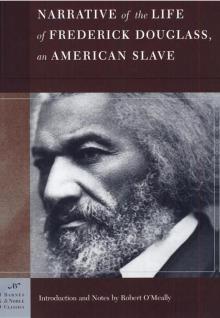 Narrative of the Life of Frederick Douglass: An American Slave
Narrative of the Life of Frederick Douglass: An American Slave My Bondage and My Freedom
My Bondage and My Freedom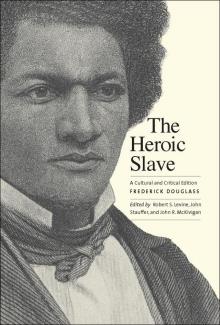 Two Slave Rebellions at Sea
Two Slave Rebellions at Sea The Color Line in America
The Color Line in America The Negro Exodus from the Gulf States
The Negro Exodus from the Gulf States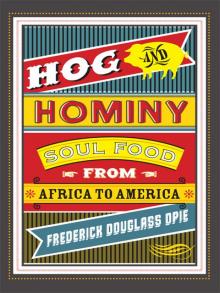 Hog and Hominy: Soul Food From Africa to America
Hog and Hominy: Soul Food From Africa to America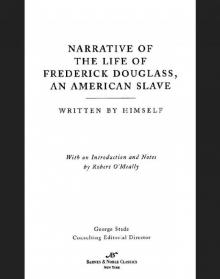 Narrative of the Life of Frederick Douglass
Narrative of the Life of Frederick Douglass![An Appeal to Congress for Impartial Suffrage [a machine-readable transcription] Read online](http://i1.bookreadfree.com/i/03/23/an_appeal_to_congress_for_impartial_suffrage_a_machine-readable_transcription_preview.jpg) An Appeal to Congress for Impartial Suffrage [a machine-readable transcription]
An Appeal to Congress for Impartial Suffrage [a machine-readable transcription] The Color Line
The Color Line My Bondage and My Freedom (Penguin Classics)
My Bondage and My Freedom (Penguin Classics)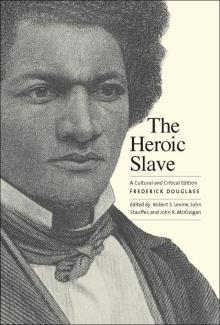 The Heroic Slave
The Heroic Slave